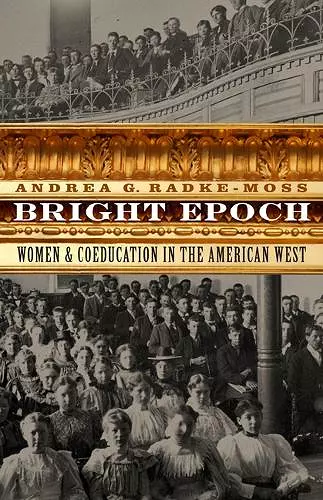Bright Epoch
Women and Coeducation in the American West
Format:Hardback
Publisher:University of Nebraska Press
Published:1st Nov '08
Currently unavailable, and unfortunately no date known when it will be back

Illuminates the diversity of courses of study available to female students, including the sciences, literature, journalism, business commerce, and law
Tells the story of female students' early mixed-gender encounters at four institutions: Iowa Agricultural College, the University of Nebraska, Oregon Agricultural College, and Utah State Agricultural College. This work illuminates the diversity of other courses of study available to female students, including the sciences, literature, and law.With the passage of the Morrill Act in 1862, many states in the Midwest and the West chartered land-grant colleges following the Civil War. Because of both progressive ideologies and economic necessity, these institutions admitted women from their inception and were among the first public institutions to practice coeducation. Although female students did not feel completely accepted by their male peers and professors in the land-grant environment, many of them nonetheless successfully negotiated greater gender inclusion for themselves and their peers.
In Bright Epoch, Andrea G. Radke-Moss tells the story of female students’ early mixed-gender encounters at four institutions: Iowa Agricultural College, the University of Nebraska, Oregon Agricultural College, and Utah State Agricultural College. Although land-grant institutions have been most commonly associated with domestic science courses for women, Bright Epoch illuminates the diversity of other courses of study available to female students, including the sciences, literature, journalism, business commerce, and law. In a culture where the forces of gender separation constantly battled gender inclusion, women found new opportunities for success and achievement through activities such as literary societies, athletics, military regiments, and women’s rights and suffrage activism. Through these venues, women students challenged nineteenth-century gender limitations and created broader definitions of female inclusion and participation in the land-grant environment and in the larger American society.
""Bright Epoch is an engaging work that puts to rest the idea that coeducational land grant education somehow stifled, rather than empowered, western women. . . . Well worth reading.""—Pamela Riney-Kehrberg , Kansas History|""Bright Epoch is overall an important, well-conceived and well-developed study of women's coeducation experiences at several early land grant colleges. . . . This is a must read for historians of women, education, rural life, and the Midwest and West.""—Ginette Aley, Nebraska History|""The book makes a valuable contribution to the study of women's higher education. This examination of western land-grant institutions sheds light on a heretofore underrepresented area of scholarship.""—Lisa R. Lindell, South Dakota History|""Radke-Moss has mined the universities' special collections to provide both written descriptions and illustrative photographs. . . . Ultimately, her well-told story should encourage others to unearth similar experiences buried in untapped college archives.""—J. H. O'Donnell III , CHOICE|""This long-overdue study of coeducational land-grant colleges fills an important niche in several areas of social and regional history. As a result, Bright Epoch provides a solid foundation onto which historians of both women and the West can build further analyses.""—Kristin Mapel Bloomberg, Great Plains Quarterly|""Bright Epoch is an excellent history because it tells of a past that reminds readers that universities should not be just domestic skill shops but rather places of debate, discourse, and great educational opportunities for all students.""—Brian S. Collier, Western Historical Quarterly
ISBN: 9780803239654
Dimensions: unknown
Weight: 680g
368 pages